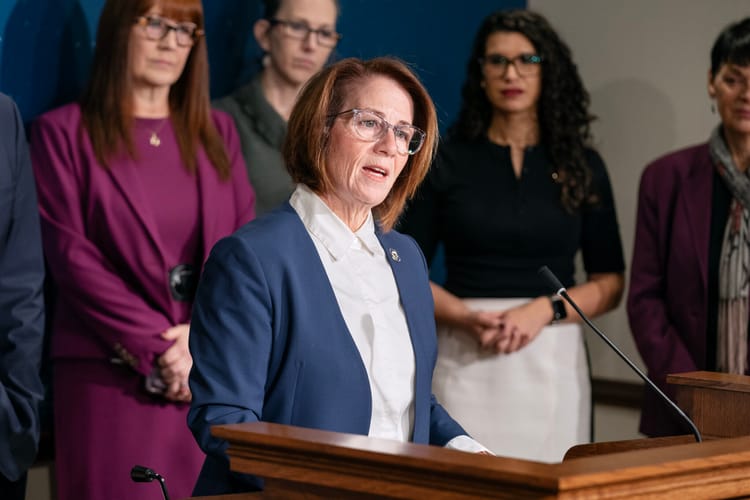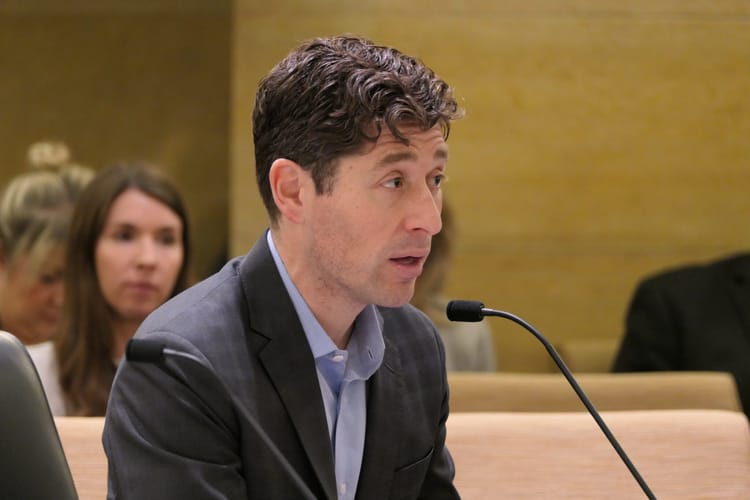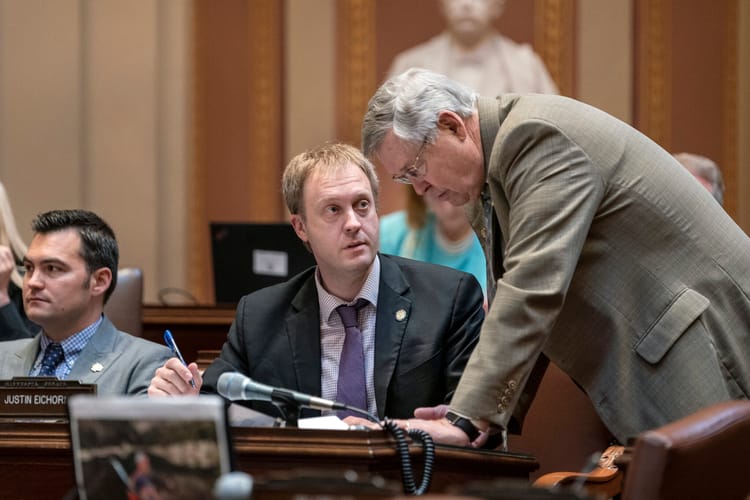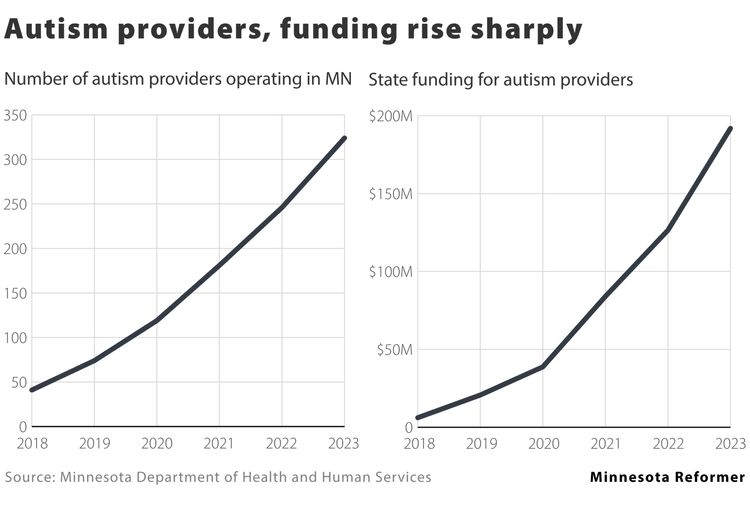What’s in Minnesota’s 2023 education bill

By Michelle Griffith, Minnesota Reformer
The Minnesota Legislature during the 2023 session passed a sweeping education bill that boosted public spending for schools by nearly $2.3 billion.
Gov. Tim Walz, a former teacher, has advocated for more school funding since the beginning of his tenure, but he was mostly stymied under a divided government. Education advocates, the state’s teachers’ union and school districts are praising the increase in spending.
Some lawmakers — and Walz — are even hoping the increase in spending can create a “Minnesota Miracle 2.0,” referring to the 1971 legislative session that made school spending more equitable across districts by relying less on property taxes. They argue the increased education spending jump-started the Minnesota economy by producing a highly educated workforce.
During a ceremonial budget bill signing last week, Walz said a “Minnesota Miracle 2.0” will pay closer attention to equity.
“If this is the ‘Minnesota Miracle 2.0,’ the difference between then and now is we’re saying today ‘We’re leaving no one behind.’” Walz said.
Here are some the significant provisions from the education bill:
More funding directly to districts
Schools for years have asked for additional state funding, and the Legislature this year boosted the general education funding formula by over $700 million in fiscal years 2024-2025.
The per-pupil formula distribution is based on district enrollment, as well as the district’s student profile. The bill increases the formula by 4% in fiscal year 2024 and 2% in fiscal year 2025. Districts will receive $7,138 per student in fiscal year 2024 — up from the current $6,683 per student. That’s a 6.8% increase.
In the years following, the formula will be indexed to inflation, with a minimum annual increase of 2% and a maximum increase of 3%.
But many schools will still ask local homeowners for property tax levies, as the Legislature did not eliminate the so-called cross subsidy — a term used around the Capitol referring to school districts paying for special education programs from their general funds because of inadequate state and federal funding.
The Legislature’s education bill says the state will pay for 44% of a school district’s special education cross subsidy in fiscal years 2024-2026 and half in fiscal year 2027 and later. This is higher than the current 6.43% Minnesota pays, but the Legislature did not eliminate the cross subsidy, despite lobbying from school districts.
Lawmakers did opt to eliminate school districts’ English learner cross subsidy by 2027, with incremental increases until then.
Early education
In addition to K-12 provisions, lawmakers also allocated $300 million in new spending on early childhood education, scholarships and other programs that prepare young children for school.
Over $250 million will go to the state’s early learning scholarships program, which is targeted at 3 and 4 year olds. Head Start and the Child Care Assistance Program also received extra funding.
The early learning programs will now be overseen by a new state agency — the Department of Children, Youth and Families — which was proposed by Walz. The new agency will administer a number of programs that were previously under different departments, including juvenile justice and child care grants. Lawmakers allocated $7 million for the creation of the department.
The new education law also permanently funds 4,000 pre-K slots — they were previously temporary — and added another 5,200 new slots.
House Speaker Melissa Hortman said in an interview with the Reformer that the Legislature’s investment in early education is her proudest legislative achievement. Hortman said securing more pre-K slots was among the things she’s been advocating for the longest in her 20-year legislative tenure.
“This year, we’ve invested big in little kids,” Hortman said.
Labor wins for teachers, staff
Legislators expanded unemployment insurance eligibility to hourly workers during the summer months. Originally, the bills in the House and Senate provided no funding for unemployment insurance. After pushback from school administrators — some who said the Legislature’s effort to provide more funding for schools would be negated by the mandatory unemployment insurance — the legislators proposed a state-funded unemployment insurance pool for school workers.
Lawmakers allocated $135 million for the fund. According to a coalition of unions, Minnesota is the first state to implement an unemployment insurance program for hourly workers during the summer. Bus drivers, paraprofessionals and food service workers will be able to apply, which should make it easier to lure people into the jobs when school is in session.
“These jobs are often done by women and people of color and most of the workers were designated as ‘essential’ during the pandemic because they kept schools running and connected to students,” the union coalition said in a statement.
The teachers’ union received another win with ongoing funding to lower the age a teacher can retire with full pension benefits from 66 to 65, according to a provision in the tax bill. The lower retirement age goes into effect July 2025. The union’s original goal was to reduce the retirement age to 62, but that effort failed.
“It just makes sense to make a full pension easier to access for the teachers who have given so much to our state,” Education Minnesota President Denise Specht said in a statement. “Pensions are also an important recruiting tool for talented people considering teaching as a career because the state of Minnesota is offering something corporate America never will – a defined-benefit pension with a reasonable retirement age.”
In addition, the Legislature’s labor bill includes a provision stating school districts must negotiate with teachers about class size during collective bargaining negotiations.
Banning religious colleges from requiring PSEO faith statements
Tucked within the education bill is a new state law prohibiting religious colleges and universities from requiring faith statements from high school students who seek college credit through a program called postsecondary enrollment options (PSEO). Two Christian colleges have already sued the state over the provision.
Two days after the session ended, the University of Northwestern in St. Paul and Crown College in St. Bonifacius filed a joint lawsuit against Walz and the Department of Education, arguing the new state law violates the First Amendment’s free exercise clause. Lawmakers argue that the law doesn’t prohibit the colleges from practicing their religious beliefs, but it is barring them from using public dollars to exclude students from the free college program based on a students’ religious beliefs.
“Ironically, the schools bringing this lawsuit are the colleges who have excluded PSEO students based on religion,” the Legislature’s Secular Government Caucus said in a statement. “Their required faith statements have excluded high school students from participating in the publicly funded PSEO program, and they will no longer be allowed to continue. Religious freedom guarantees all people the right to believe and practice any faith or none at all, and institutions participating in this program must abide by that.”
According to the complaint, the plaintiffs — two Christian families and colleges — are represented by Washington D.C.-based law firm Becket Law, a firm with a history of “religious liberty” litigation.
Curricula changes
Lawmakers also added civics and personal finance to the list of required courses students need to take to graduate high school beginning next school year.
In addition, schools will be required to teach Holocaust and genocide studies by the 2026-2027 school year. High schools also need to offer ethnic studies courses by the same year, while elementary and middle schools have an additional year to develop ethnic study classes.
On top of required courses, the Legislature allocated nearly $75 million next biennium to restructure the way Minnesota teaches students how to read.
Reading test scores dropped last year, with 51% of Minnesota students proficient in reading. The Legislature adopted The Read Act, which directs districts to employ evidence-based best practices like phonics and reading comprehension.
Lawmakers also overhauled the way Minnesota schools practice active shooter drills. The active shooter simulations are now banned. Instead, districts are required to provide students with at least one hour of violence prevention training per year.
Sen. Mary Kunesh, DFL-New Brighton, during a committee hearing, described the kinds of adverse effects the simulations had on students during her years as a teacher. Sometimes the drills at her school included police officers entering the building, jiggling classroom door handles and looking into windows. Kunesh said elementary school students would be scared during and after the drill.
Free food, free menstrual products, Naloxone at the ready
Earlier in the legislative session, lawmakers approved universal free breakfast and lunch for all eligible schools, which will cost about $200 million annually. The program aims to eliminate the stigma attached to students who receive food aid, and reduce the bureaucratic burden on families and schools that have been mired in paperwork required to obtain free and reduced-price meals.
Schools will now be required to provide menstrual products to students, as well as opiate antagonists, like Naloxone.
Minnesota Reformer is part of States Newsroom, a network of news bureaus supported by grants and a coalition of donors as a 501c(3) public charity. Minnesota Reformer maintains editorial independence. Contact Editor Patrick Coolican for questions: info@minnesotareformer.com. Follow Minnesota Reformer on Facebook and Twitter.





Member discussion